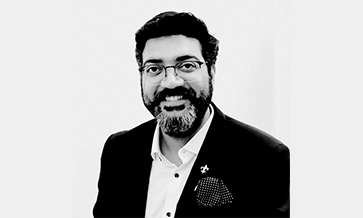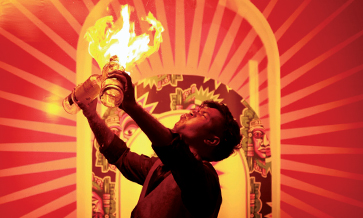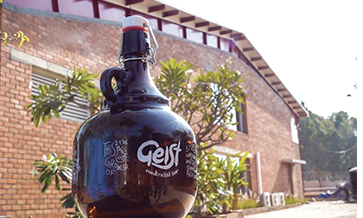Beverage alcohol retail in India, which accounts for 80% of sales, is finally coming around to ‘Customer is King’
The analogy of an iceberg is perfectly well suited to alcohol sales in India, with the portion under the water represented by retail, accounting for nearly 80% of sales but very little visibility. Although the on-trade accounts for just 1/5th of sales, it has a much higher and glamourous profile.
The conventional wisdom in the Indian alcobev market is that brands are built in the on-trade and conversion happens in the off-trade. In the serious words of one retailer: “All the kharcha (spend) is in the on-trade, but the kamai (earning) is in the off-trade.”
Walk into any well-appointed liquor store in India and that statement might seem a little off, given the investment made by liquor brands in in-store visibility and taking care of a large part of the store’s fixed costs. Yet, it points to the fact that liquor retailers in India often feel that they are living in the shadows.
The fast-changing nature of the liquor industry in India, however, coupled with the actions of a growing number of young entrepreneurs, is forcing liquor companies to re-evaluate their strategies for engagement with alcohol retail – as well as changing the shape of liquor retail in India as we know it.
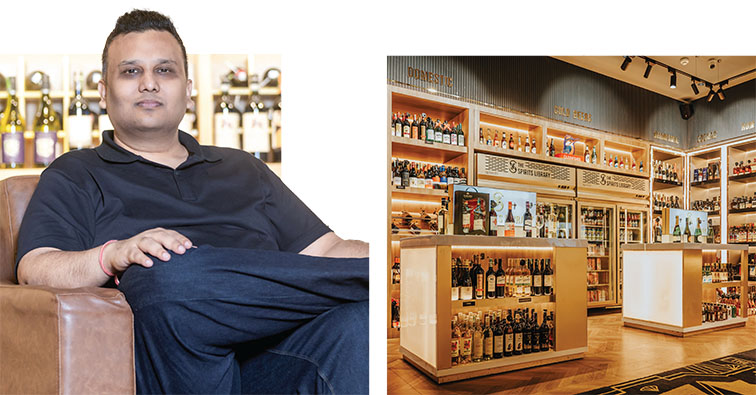
Guwahati-based Vishal Deorah’s (L) brands, The Whiskey Company, The Warehouse and The Spirits Library (R), are bringing ‘big box’ retailing to North-East India.
Regulatory overview
The regulatory environment in India surrounding alcohol retail is complex. Navigating this is one of the first challenges retailers face. In states such as Tamil Nadu and Kerala, the state controls both distribution and retail, with the results visible on the ground.
In West Bengal, Karnataka and Rajasthan – ‘corporation markets’ as they are known – the distribution is controlled by the state, while retail is in private hands. In markets such as Maharashtra, Goa and Haryana, both distribution and retail are private.
Each of the models comes with its own set of challenges, such as retailer access to stocks in corporation markets primarily dictated by the retail store’s distance from the government depot.
In most states the temporary nature of the license itself can be a challenge. Some governments put up licenses for auction every 1 or 2 years – in a few progressive states it happens every 4 years.
Alcohol pricing may also be fixed in some states, or free pricing in others. The transient nature of the business thus throws all conventional management practices out of the window when managing retail outlets.
Growing ambition
For someone like me, who has observed the evolution and growth of the high-end bars and pubs over the last few years, one of the definite contrasts in the off-trade is the scale of ambition of new entrepreneurs.
When you consider the capital requirements of the business, which can be substantially higher than opening a bar, that ambition appears to be much larger!
Vishal Deorah, based in Guwahati, began his journey 13 years ago, managing a single outlet on the Meghalaya-Assam border. He now manages over 13 medium- to large-format stores over Assam and Meghalaya and aims to expand into West Bengal and Tripura.
His brands – The Whiskey Company, The Warehouse and The Spirits Library – are bringing in “big box” retailing into the North-East. Fascinated by the “lore and craftsmanship of alcohol”, he decided to take the plunge when he heard of a struggling store up for sale. “At worst, if sales didn’t take off, I’d always have a cold beer within arm’s reach!” he quips.
Take the Living Liquidz group, founded by Mokksh Sani’s father in 1978, which had 18 stores when Mokksh joined the family business in 2005. It has now grown into a chain of 60 stores across Mumbai, Pune, Navi Mumbai and Thane. Mokksh has expanded into Bengaluru, Goa and Bhubaneswar and runs multiple airport shops across the country.
The plan is to scale up to 100 stores in India by 2026-27, with expansion planned into Bhopal and Kolkata. Living Liquidz’s experiential retail concept, Mansions, has further transformed the retail experience with tasting rooms and well-groomed and trained staff who offer you a cup of coffee as you browse.
Down South, it is Anith Reddy, who in 2016 decided to change the face of liquor retail, first in Hyderabad and then in Bengaluru, with Tonique. These are retail outlets reaching up to 18,000 square feet. With six stores across Hyderabad, Pune and Bengaluru, Anith aims for 100 stores in the next 2-3 years.
What Tonique, Living Liquidz and the Whiskey Co did was force retail chains to hasten their pace of change and growth in their respective states.
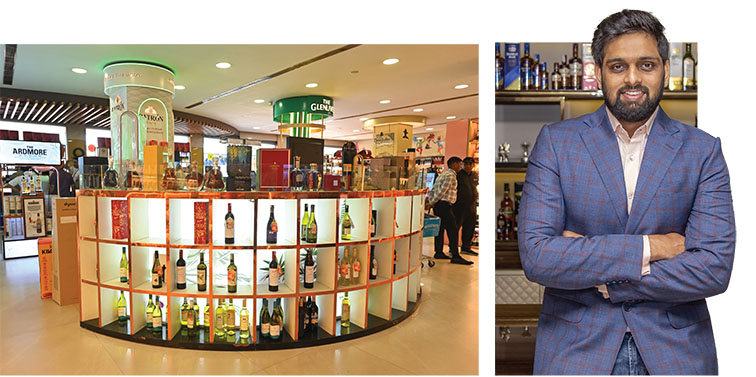
The Liquor Warehouse (L), run by Viraat Maan (R), a game changer in Gurugram, has grown into 18 outlets.
Flagship brands
In the North, the liquor retail business begun by the Maan family in the early 1990s has mushroomed into 18 retail outlets in Gurugram, including the flagship The Liquor Warehouse, which was an early game changer in the city. The group’s vision over the next few years is to grow the brand across Haryana and neighbouring states.
In Mumbai, Udit Sethi’s father started the liquor retail business in 1984. Since then, the family has grown to own and control 15 liquor stores across Mumbai – and Hops Cork, a specialist wine and beer retailer.
A chain started by Saurabh Goel in 2001 with a single outlet now spans 280 stores across key cities of Uttar Pradesh and Madhya Pradesh. Saurabh has also spawned ‘Weekend’, “a retail concept crafted for the modern shopper”. Weekend has grown from five to 10 stores. A new brand’s launch is also planned with an initial rollout of 30 outlets.
Strategically, most chains have created 1-2 flagship stores and/or exclusive sub-brands that lend a halo to the rest of the group. The expansion is also taking place not just in one state but across multiple states, leading to the creation of multiple store formats within the same group – from specialised beer and wine retail to airport shops.
One of the most significant changes wrought by these entrepreneurs in alcohol retail in India has been the move from counter-top sales to walk-in stores. I must mention that such scale and growth have come despite often stifling excise laws that inhibit long-term thinking!
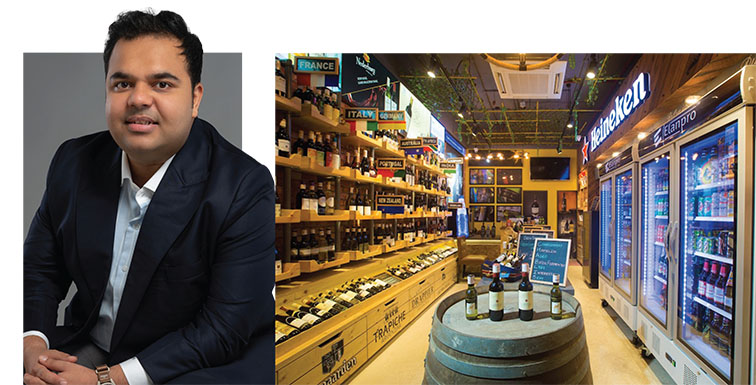
Udit Sethi’s (L) liquor retail business has grown to 15 liquor stores across Mumbai, including Hops Cork (R), a specialist wine and beer vend.
Modern trade
As retailers tell me, this change has come with its own set of challenges, including that of hiring and training of professional talent. Vatsal Goel of Weekend Wines in Noida has a challenge managing large customer-facing teams.
Then there is inventory management to handle a larger number of SKUs (stock keeping units). As stores often triple and quadruple in size, the visual merchandising also requires constant attention.
Viraat Maan of The Liquor Warehouse says, “Creating a premium walk-in experience requires a minimum of 4,000 square feet of space, which is rare and highly sought after.”
Financial investment in infrastructure, workforce, interiors, high quality and large inventory can be daunting. Vishal Deorah of The Whiskey Company says, “Walk-in stores have 10x the overheads, but only 3x the sales.”
Mokksh of Living Liquidz feels security of the premises and compliance with all regulations can be a challenge. “Managing open retail spaces requires strong security protocols,” he notes.
Consumer shift
Changes in beverage alcohol sales have also been a function of the shift in the consumer profile and his/her shopping behaviour. Tonique’s Anith points to a change in purchase pattern, from ordinary spirits to high-end single malts, vodka and gin.
The ambience and sense of security created by modern-day retail stores are also enabling women to enter stores and select alcohol for themselves and their families.
Vishal says customers are now more informed, curious and brand conscious. He also points to a growing preference for “sustainable and activist brands”, pushing him to constantly adapt his inventory, build a stronger online presence and collaborate with emerging labels that align with evolving values.
Mokksh points out: “Today’s consumer is more informed, experimental and premium-focused. S/he seeks experiences, not just transactions.”
Viraat corroborates this, saying that it’s not uncommon for patrons to spend up to 40 minutes exploring their options, reflecting a deeper interest and appreciation for the products they choose.
Soft skills
Udit Sethi of Mumbai’s Hops Cork mentions that the consumer’s experience-seeking behaviour has pushed stores to invest in staff training and have on board sommeliers and brewmasters to be able to enhance the consumer experience, either in-store or on call.
He also points to the need for English-speaking staff, as that’s the experience the customer wants. Viraat points to active collaboration with brand partners to conduct regular training sessions for the team based on practices in the hospitality industry, instilling in the team the core values of exceptional customer service.
At the Whiskey Co and its sister stores, an in-house training programme is led by a WSET Level-4 (diploma) holder who is also a certified educator. The team undergoes daily training sessions on product knowledge, global trends and brand updates.
There is also a focus on relationship management with the customer to ensure that the salesperson is seen as a trusted advisor each time a customer comes back.
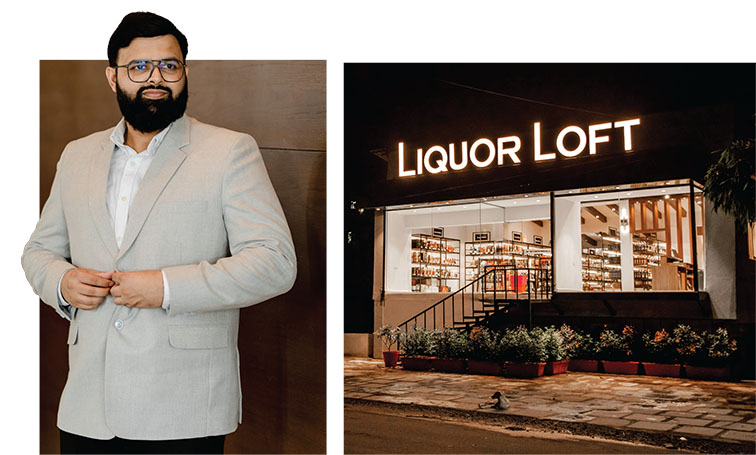
Raul Costa (L) of Goa’s Liquor Loft (R) says established software for pharma retail, after modifications, was good enough for his liquor business.
Tech savvy
In a recent conversation with Jatin and Vardaan, co-founders of Bottle Shop, a technology start-up aimed at liquor retail, I was surprised to hear about the extensive manual nature of record keeping and reporting. In some cases, the consequences could lead to crores rupees in lost sales due to poor inventory management.
Fortunately, progressive retailers fast realize the need for reinvention not just in front of the house but also in the technology backbone of their business. Udit developed a best-in-class retail software in 2016, integrated with statistical and operations reporting on a real-time basis. Developed in-house, it is now an IP of theirs called Hops Cork Mastermind.
Raul Costa of Goa’s Liquor Loft, with stores in Arpora and Margao, says that noticed that retail pharma software had a lot in common with the liquor retail environment in Goa. This enabled him to pick an established software for pharma retail and make the necessary modifications for his liquor business!
The software has helped generate and collect various data points like inventory movement, stock aging, expiry reports, multiple SKUs, sales trends, purchase planning and other accounting-related data. “Software has been a critical backbone of our liquor business,” Raul emphasises.
Like many others, Vishal Deorah of the Whiskey Co uses software for billing, customer relations and loyalty programmes and is working toward a model in which all stores function as a unified grid.
Wise words
Sukhinder Singh, co-founder of London-based The Whisky Exchange, has won every liquor retail award in the UK, some of them won multiple times! In a recent webinar for India’s liquor retailers, he said he was impressed by the growing sophistication and ambiance.
But he cautioned retailers not to give over their stores completely to liquor brands, which tend to blanket the store with their branding, visibility and display to crowd out other products, especially the smaller ones.
He also pointed to the need for specialism in product assortment, giving his example at the Whisky Exchange, known for its relentless focus on the whisky category and select labels from around the world.
This specialism was combined with a relentless investment in training his shop floor staff to ensure they became trusted advisors to their customers. “With liquor stores mushrooming across India – and sometimes having little to distinguish one from another from the outside – factors like this can truly differentiate a store,” he had said.













